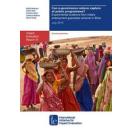
Can e-governance reduce capture of public programmes? Experimental evidence from India’s employment guarantee scheme in Bihar
3ie Impact Evaluation Report 31
With close to 50 million beneficiary households in 2013, the Mahatma Gandhi National Rural Employment Guarantee Scheme (MGNREGS) is one of the largest social protection programmes in the world today. It gives the right to 100 days of work per year per household to all rural adults willing to do unskilled manual labour. Bihar has the lowest participation rate in MGNREGS of any state in India and has high, unmet demand for work. One of the reasons for low participation may be constrained administrative capacity to spend centrally transferred funds.
This study by Abhijit Banerjee, Esther Duflo, Clément Imbert, Santhosh Mathew and Rohini Pande reports on a field experiment that evaluated an e-governance reform of the fund flow system for MGNREGS. This reform reduced the number of administrative tiers associated with wage disbursement and changed the informational requirements for requesting and disbursing programme funds.
The study findings show that the intervention reduced MGNREGS spending, left employment and wages unchanged and delayed labour payments. On the one hand, these results are disappointing because the intervention aimed at increasing employment and facilitating the fund flow. On the other hand, the fact that spending decreased by 25 per cent with no effect on employment or on wages paid (apart from delays) suggests that the intervention reduced leakages of MGNREGS funds by a large margin.
This study has been funded under 3ie’s Social Protection Thematic Window with support from DFID. Ten research teams were awarded grants under this grant window to evaluate key social protection interventions in Africa, Asia and Latin America.




